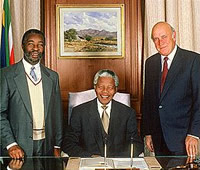Training and Advice Contributing to a New Constitution and a Peaceful Transition from Apartheid to Democracy in the Republic of South Africa

President Mandela and Vice Presidents de Klerk and Mbeki After Negotiating the First National Unity Government of South Africa.
In the early 1990s, South Africa as a nation faced a tremendous challenge. They sought to negotiate a peaceful transition from the apartheid regime to a democracy that would be acceptable to blacks and whites alike. Many thought the task was hopeless.
The road to reconciliation had been preceded by decades of violence. In the 1950s, the ruling National Party, dominated by the Afrikaners, South Africa’s Dutch settlers, formally established the apartheid system. Blacks could live only in certain designated areas and were denied the right to vote. Opposition political parties were outlawed and black politicians were exiled, imprisoned, and sometimes murdered. Racism and violence were the order of the day. Years of protest and international sanctions finally lead to historic talks that began in secret between the government and African National Congress leader Nelson Mandela, a political prisoner for twenty-seven years. The newly elected president, F.W. DeKlerk, surprised the world in February 1990 by dismantling segregation laws and legalizing the ANC. Mandela was free, and serious negotiations began. Unfortunately, the decades of violence and armed resistance left both sides traumatized and deeply suspicious of each other’s motives. Many viewed negotiation only as the process for making concessions and thus tantamount to treason, for which alleged traitors were “necklaced.”
Beginning in the late 1980s and continuing into the mid 1990s, as representatives of Conflict Management Group, the late Roger Fisher, PrimeMovers managing director Charles Barker and other colleagues made numerous trips to South Africa. They worked through the Wilgispruit Fellowship Center at the direction of then Archbishop Desmond Tutu and present Bishop Joseph Seoka, the African National Congress, the National Party, the Dutch Reformed Church, AZAPO, and the Inkatha Freedom Party to teach cooperative interest-based negotiation process to leaders among all factions and to advise key leaders and their negotiators. Of course, the work of Fisher, Barker and their colleagues was only one small part of a massive nation wide effort attracting international support that continues to this day. Nonetheless, as the lead constitutional negotiators, Cyril Ramaphosa and Roelf Meyer explained to Roger Fisher in a late 1990s interview, the cooperative interest-based negotiation process was the approach that they, their principals, and their constituencies used to create solution after solution leading finally to a new constitution and democratic elections.
